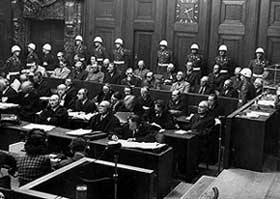Post Date: November 13, 2005
The International Military Tribunals at Nuremberg are widely regarded to have changed the course of history. The legacy of the trials for courts, social institutions and broader society was the focus of the two-day conference, “Pursuing Human Dignity: The Legacies of Nuremberg for International Law, Human Rights, and Education.”
Organized by Harvard Law School and Facing History and Ourselves, a Boston-based non-profit organization that promotes tolerance and civic engagement, the event took place November 3 and 5 under the direction of co-chairs Professor Martha Minow and Margot Stern Strom, director of Facing History.
The first day of the conference focused on the legacy of Nuremberg for international law. Panels of scholars and experts – including some who played a role in at the trials, like Benjamin Ferencz, a chief prosecutor for the U.S. at Nuremberg – offered their perceptions on the impact of Nuremberg, where the term “genocide” was coined and the concept of crimes against humanity began to emerge.
The conference also considered the effect of Nuremberg on the International Criminal Court. Both institutions have sought to use legal proceedings as a substitute for immediate executions or retaliatory strikes as a means of reconciliation after war.
The conference’s second day, which focused on Nuremberg’s legacy for education, featured Minow along with educational experts and human rights activists, such as Samantha Power, author of the Pulitzer Prize-winning book on the subject of genocide. Power spoke alongside Luis Moreno-Ocampo, the ICC’s first chief prosecutor, to discuss the future of the ICC and how to promote education that could prevent crimes of war.
Panelists agreed that the legal dimensions of genocide and war crimes are inextricably connected to educational challenges. “We found bridges between law and education throughout the conference,” said Minow. “The remaining challenge is to sharpen what students should learn to prevent genocide in the future.”
